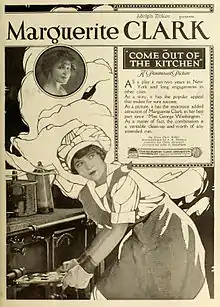Come Out of the Kitchen
Come Out of the Kitchen is a lost[1] 1919 American silent drama film produced by Famous Players-Lasky and distributed by Paramount Pictures. It was directed by John S. Robertson and starred Marguerite Clark.[2] The film is based on Alice Duer Miller's 1916 Broadway play of the same name that starred Ruth Chatterton.[3]
| Come Out of the Kitchen | |
|---|---|
 Period advertisement | |
| Directed by | John S. Robertson Frank Walton |
| Produced by | Adolph Zukor Jesse Lasky |
| Written by | Clara Beranger (scenario) |
| Based on | Come Out of the Kitchen!: A Romance by Alice Duer Miller |
| Starring | Marguerite Clark |
| Cinematography | Jacques Monteran (fr) Hal Young |
| Distributed by | Paramount Pictures |
Release date |
|
Running time | 5 reels |
| Country | United States |
| Language | Silent (English intertitles) |
Parts of the film was shot at Pass Christian, Mississippi.[4]
Plot
As described in a film magazine,[5] Claudia Daingerfield (Clark) is the resourceful daughter of an old and invalid Southern aristocrat Mr. Daingerfield (Stevens). All that remains of his property is a fine old Virginian country house, barely maintained by Claudia, her sister Elizabeth (Kaye), her brothers Paul (Barker) and Charles (Hackett), and their African-American cook Mammy Jackson (Miller), who is still loyal to the household. When father goes North to consult a great physician, there is no money left when news comes that a costly operation must be performed. There is only one way this expense can be met, and that is by accepting an offer by Northerner Burton Crane (O'Brien) for temporary lease and occupation of the fine house for $3,000, though he insists on having only white servants. As a result, the members of the former high-born Southern family take the servant positions, with Claudia as cook, her sister Elizabeth as maid, and her brothers as a butler and general worker. Then ensues a comedy with the family performing domestic service to people less kind and appreciative, with Claudia struggling in an attempt to cook for the entire family until she is forced to call upon the services of Mammy Jackson and keep her out of sight with ingenious and amusing devices. Claudia bravely steers through this sea of trouble while fascinating the Northerners staying at the house. Burton Crane slowly falls in love with her and seriously thinks of taking her out of the kitchen, thinking she is a wonderful cook. He comes across a miniature of her, but when it disappears he accuses the older brother of stealing it and has him discharged. One by one the members of the family who took positions as servants are discharged until only Claudia remains. After a telegram arrives stating that her father has survived the dangerous operation causes Claudia to falter, and Burton discovers what has been going on. Recognizing her superb plunk, Burton asks her to become his wife.
Cast
- Marguerite Clark as Claudia Daingerfield
- Frances Kaye as Elizabeth Daingerfield
- Bradley Barker as Paul Daingerfield
- Albert Hackett as Charles Daingerfield
- George Stevens as Mr. Daingerfield
- May Kitson as Mrs. Daingerfield
- Eugene O'Brien as Burton Crane
- Fred Esmelton as Solon Tucker
- Crauford Kent as Randolf Weeks
- Augusta Anderson as Mrs. Faulkner
- Rita Spear as Cora Faulkner
- Frances Miller as Mammy Jackson
- George Washington as Snowball
References
- The Library of Congress American Silent Feature Film Survival Catalog: Come Out of the Kitchen
- The AFI Catalog of Feature Films: Come Out of the Kitchen
- The Broadway League. "Come Out of the Kitchen". ibdb.com. Retrieved 11 April 2015.
- Progressive Silent Film List: Come Out of the Kitchen at silentera.com
- Harrison, Louis Reeves (May 24, 1919). "Reviews and Advertising Aids: Come Out of the Kitchen". Moving Picture World. New York City: Chalmers Publishing Company. 40 (8): 1225. Retrieved 2014-09-12.
External links
| Wikimedia Commons has media related to Come Out of the Kitchen. |
- Come Out of the Kitchen at IMDb
- allmovie/synopsis; Come Out of the Kitchen
- Still from the production with Eugene O'Brien and Marguerite Clark (University of Washington, Sayre collection)